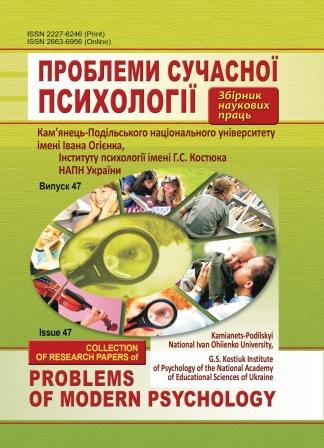Науково-теоретичний аналіз проблеми комунікації в сучасних зарубіжних теоріях
DOI:
https://doi.org/10.32626/2227-6246.2020-47.27-47Ключові слова:
комунікація, комунікативна взаємодія, спілкування, теорії комунікації.Анотація
У статті представлено системний теоретико-методологічний аналіз підходів до проблеми комунікації. Здійснено порівняння концептуальних положень основних зарубіжних досліджень. За результатами науково-теоретичного й порівняльного аналізу систематизовано зарубіжні теорії комунікації та виокремлено основні їх групи. Метою цих досліджень є визначення теоретичних аспектів феномену комунікації. Для реалізації мети використано теоретичні методи дослідження: аналіз психологічної літератури, систематизація, узагальнення, структурування теоретичних концепцій. За результатами аналізу розкрито основні напрями зарубіжних досліджень. Серед усіх теорій виокремлено інформаційні, у яких повідомлення передається за допомогою системи знаків і символів, які кодують необхідну інформацію. Описано теорії транзакції, які розглядають комунікацію як систему одночасної взаємодії партнерів по спілкуванню, що супроводжується поперемінною зміною позиції та вказує на взаємозалежність елементів. Відображено сутність гелічних теорій, в основу яких покладено динамічну модель спілкування як поступове набуття досвіду комунікативної взаємодії. Охарактеризовано соціальні теорії, що вивчають соціальний контекст комунікації й описують особливості соціалізації індивіда. На основі аналізу соціальних теорій опрацьовано проблеми комунікативних процесів, що відбуваються у сучасному суспільстві, та впливу мережевого спілкування на їх розвиток. Виокремлено психолінгвістичні теорії, що вивчають мову та мовлення у якості засобів комунікативної взаємодії. Представлено культурні теорії, які акцентують увагу на формуванні мовленнєвої культури та навиків спілкування в культурному середовищі, що вважається визначальною характеристикою рівня розвитку суспільства. Відтворено теорії реляційної діалектики, що уточнюють особливі вимоги до комунікації в умовах напруженості й простежують основні чинники, які впливають на подолання конкурентної чи конфліктної міжособистісної взаємодії. Автором здійснено низку узагальнень і зроблено висновок про необхідність вивчення змістових характеристик цих теорій для розширення комунікативних компетентностей учасників соціуму, підвищення їх комунікативної активності та забезпечення пріоритетних напрямів взаємодії в умовах сучасного суспільства. Статтю підготовлено з метою розширення інформаційної бази проблеми комунікації задля визначення й окреслення основних напрямів емпіричного дослідження щодо з’ясування психологічних особливостей комунікативних навичок та окреслення шляхів їх формування на основі представлених теоретичних досліджень.
Посилання
Гончарук Н. М., Онуфрієва Л. А. Психологічний аналіз рівнів побудови комунікативних дій. Psycholinguistics. Психолінгвістика. Психолингвистика. 2018. Вип. 24 (1). С. 97–117. DОІ 10.31470/2309-1797-2018-24-1-97-117.
Bajracharya, Sh. (2018). Helical model of communication. Businesstopia. URL : https://www.businesstopia.net/communication/helical-modelcommunication (дата звернення: 28.01.2020).
Bencini, G. (2013). Psycholinguistics: the Oxford handbook of construction grammar. Th. Hoffmann & G. Trousdale (Eds.). Oxford : Oxford University Press. 606 p.
Cobley, P., Deely, J., Kull, K., & Petrilli, S. (Eds.) (2011). Semiotics continues to astonish: Thomas A. Sebeok and the doctrine of signs. Semiotics, communication and cognition. Berlin : De Gruyter Mouton. P. 85–114.
Cody, M. J., & McLaughlin, M. L. (1989). The psychology of tactical communication: мonographs in social psychology of language. Bristol : Multilingual Matters. 376 p.
Dunbar, R. (2010). How many friends does one person need?: Dunbar’s number and other evolutionary quirks. London : Faber & Faber. 302 p.
Epure, M., Eisenstat, E., & Dinu, C. (2014). Semiotics and persuasion in marketing communication. Linguistic & Philosophical investigations. Р. 592–605.
Gavi, Z. (2013). Тhe models of communication. Сommunication process. URL : http://thecommunicationprocess.com/models-of-communication/ (дата звернення: 30.01.2020).
Gоrniak, J., Kołdras, S., Mazu, S., & Paszkowska, R. (1999). Komunikacja i partycypacja społeczna: poradnik. Jerzy Hausner (Ed.). Krakоw. 198 s.
Josse, E. (2019). Les techniques de communication dans la relation d’aide psychologique. Notions de base. Nancy : Pôle universitaire européen de Lorraine. URL : https://www.academia.edu/40203501/Les_techniques_de_communication_dans_la_relation_daide_psychologique._Notions_de_base (дата звернення: 22.01.2020).
Hall, B. J. (1992). Theories of culture and communication. Communication theory, 2 (1), 50–70.
Keya, А. (2013). Interpersonal communication transactional model best human communication URL : https://www.academia.edu/8025834/INTERPERSONAL_COMMUNICATION_TRANSACTIONAL_MODEL_BEST_HUMAN_COMMUNICATION (дата звернення: 30.01.2020).
Krauss, R. M., & Fussell, S. R. Social psychological models of interpersonal communication. URL : http://www.columbia.edu/~rmk7/PDF/ Comm.pdf (дата звернення: 28.01.2020).
Lanigan, R. L. (2013). Theories and models of communication: Information theories. P. Cobley & P. Schulz (Eds.). Handbooks of communication science, 22 (1), 58–83. Berlin, Germany; Boston, USA : De Gruyter Mouton.
Lull, J. (2000). Media, communication, culture. A global approach. New York : Columbia University Press. P. 160–188.
Maharjan, P. (2018). Relational dialectics theory. Businesstopia. URL : https://www.businesstopia.net/communication/relational-dialectics-theory.
Nauridis, K. (2013). Communication psychology – psychodynamic approach. Undergraduate curriculum. URL : https://eclass.uoa.gr/
courses/PPP499/ (дата звернення: 20.01.2020).
Opayemi, A. S., Oyeleke, J. T., Popoola, A. B., & Oguntayo, R. (2019). Psychology of language: communication and social behaviour. Language and literature for communication in human societies. Port-Novo, Republic of Benin : Institute Universitaire Panafricain. URL :https://onlinelibrary.wiley.com/doi/abs/10.1111/pops.12244] (дата звернення: 23.01.2020).
Phillippi, A., & Avendaño, C. (2011). Empoderamiento comunicacional: competencias narrativas de los sujetos. Communicative empowerment: narrative skills of the subjects. Comunicar. Revista científica de educomunicaciоn, 36, XVIII, 61–68.
Pitiot, R. (2011). Information theory. Education, technology. URL : https://www.slideshare.net/rogerpitiot/information-theory (дата
звернення: 30.01.2020).
Popescu, M. (2012). Psychology of communication – between myth and reality. International journal of academic research in accounting, finance and management sciences, 2 (1), 321–325.
Suresh, К. (2003). Journalism and mass communication. Theories of communication. New Delhi. URL : http://www.peoi.org/Courses/Coursesen/mass/mass2.html (дата звернення: 23.01.2020).
##submission.downloads##
Опубліковано
Як цитувати
Номер
Розділ
Ліцензія
Редакція має повне право публікувати у Збірнику оригінальні наукові статті як результати теоретичних і експериментальних досліджень, які не знаходяться на розгляді для опублікування в інших виданнях. Автор передає редколегії Збірника права на розповсюдження електронної версії статті, а також електронної версії англомовного перекладу статті (для статей українською та російською мовою) через будь-які електронні засоби (розміщення на офіційному web-сайті Збірника, в електронних базах даних, репозитаріях та ін).
Автор публікації зберігає за собою право без узгодження з редколегією та засновниками використовувати матеріали статті: а) частково чи повністю в освітніх цілях; б) для написання власних дисертацій; в) для підготовки абстрактів, доповідей конференцій та презентацій.
Автор публікації має право розміщувати електронні копії статті (у тому числі кінцеву електронну версію, завантажену з офіційного web-сайту Збірника) на:
- персональних web-ресурсах усіх Авторів (web-сайти, web-сторінки, блоги тощо);
- web-ресурсах установ, де працюють Автори (включно з електронними інституційними репозитаріями);
- некомерційних web-ресурсах відкритого доступу (наприклад, arXiv.org).
Але в усіх випадках обов’язковою є наявність бібліографічного посилання на статтю або гіперпосилання на її електронну копію, що містяться на офіційному сайті Збірника.






